Non-alcoholic beverages have evolved in recent years. Today, they constitute a rapidly expanding premium category, both in terms of product development and market growth. This category encompasses sophisticated offerings, functional formulations, and sensory experiences with high added value. It is a beverage segment that is redefining the global consumption landscape, ranging from premium cocktails and 0.00 beers to probiotic, adaptogenic, and energy drinks. Therefore, brands need to identify the causes of this non-alcoholic beverage trend in order to innovate products, attract consumers, and position themselves strategically. The key is to use ingredients that meet market expectations.
In this post, we delve into the factors driving the consumption of alcohol-free beverages. We also present the reasons why concentrated grape juice plays a strategic role in the formulation of non-alcoholic or low-alcohol beverages.
- Non-alcoholic beverages are booming. What is driving this trend? How is this market evolving?
- The role of concentrated grape must in non-alcoholic beverage innovation
- Examples of non-alcoholic beverages made from concentrated grape must
- JULIÁN SOLER: your partner in premium non-alcoholic beverage innovation
Non-alcoholic beverages are booming. What is driving this trend? How is this market evolving?
Let’s take a look at the data from the non-alcoholic beverage market and the emerging consumption patterns that are driving this disruptive trend.
Unstoppable global growth
How true is it that we are entering an alcohol-free era? Let’s look at the numbers:
- In Europe, non-alcoholic beverage consumption continues to gain ground. According to a study on trends by Innova Market, 29% of consumers purchased this type of product between 2023 and mid-2024, especially consumers from Generations Z and X. Of course, it is true that traditional beer maintains a high frequency of consumption per week (53%), while its 0.00 version barely reaches 37%. However, this is a market in which non-alcoholic spirits are booming, with a consumption rate of 53%, on par with traditional beer and higher than the consumption of alcoholic spirits. In addition, the study shows that European consumers:
- Consumption of non-alcoholic beverages has increased. The reasons: 26% due to health benefits and 37% to control alcohol consumption.
- Wine and beer consumption has also declined slightly. The reasons: 29% due to lifestyle changes and 27% because they consider its effects to be harmful.
- In the US, according to a study by Mintel, the non-alcoholic beverage industry has grown by 10% during 2024. Specifically, 30% of US consumers (of all ages) are consciously reducing their alcohol intake, either to moderate it or to quit completely.
- What alternative non-alcoholic beverages does this market prefer? Mainly energy or hydrating drinks, teas, non-alcoholic botanical cocktails, innovative beverages that promote health or offer a multisensory appeal, such as familiar fruit flavors fused with aromas and textures that are pleasing to the palate. Non-alcoholic beer and sparkling wines are also becoming popular.
- IWSR data forecasts an annual growth rate of 18% for the alcohol-free beverage market between 2024 and 2028. This analysis predicts that all categories of non-alcoholic beverages will outgrow their alcoholic counterparts.
- In Asia. Studies by Bis Research in Asia-Pacific show significant expansion in the non-alcoholic beverage market. This includes juices, teas, functional beverages, vegetable drinks, and sugar-free soft drinks.
And if we look at innovation data, the rate of new non-alcoholic beverage launches in Europe has been five times higher than that of traditional alcoholic beverages overall.
New consumer habits
In general, the rise in popularity of non-alcoholic beverages is due to the following factors:
| Prioritizing health | Consumers are increasingly prioritizing their well-being. They are opting for alternatives that align with a healthier lifestyle, whether for medical, religious, or personal reasons. Consumers seek to avoid the negative effects of alcoholic beverages, opting for more natural and functional alternatives without colorants, preservatives, or sugar, which offer added value to improve hydration, energy, digestive health, the immune system, etc. The mindful drinking movement encourages consumers to make intentional decisions about alcohol consumption, to reduce their consumption, or to eliminate it entirely. It also encourages people to explore alternatives for social gatherings and for the well-being of the body. |
| Cultural changes | Lifestyles are changing. This is particularly evident among Generation Z, who reject alcoholic beverages more strongly than other generations. According to a study by Mintel in Great Britain, a significant percentage of young consumers between the ages of 20 and 24 are giving up alcohol and embracing sober socializing. It specifies that one-third of these young people do not drink alcohol, while the rest only consume it as an occasional treat, on special occasions, or to relax. Why are young people drinking less alcohol? To better manage their emotional well-being. To prefer the functional benefits (nutrients, probiotics, low calories, etc.) of new non-alcoholic or low-alcohol beverages. To prioritize meaningful experiences over excessive consumption. Because of the influence of the mindful drinking movement. And wine brands are aware of this. Some are even targeting Generation Z directly, offering them alternatives with lower alcohol content for guilt-free consumption. All of this is changing society’s perception of sobriety. Today, non-alcoholic beverages are seen as modern, attractive, and desirable options. |
| Beverage innovation | Another factor driving the boom in non-alcoholic beverages is the introduction of premium offerings by multiple brands. Beyond teas and soft drinks, companies are bringing to market formulations that reinterpret traditional alcoholic beverages or offer alternative non-alcoholic or low-alcohol beverages with high sensory value and complex textures. |
| Quality | In the past, non-alcoholic beverages were perceived as lower quality products with bland or unappealing flavors. Today, that perception has changed. The beverage industry is applying the same quality standards, carefully selecting ingredients, and using the same production techniques as those used in premium alcoholic beverages. |
The role of concentrated grape must in non-alcoholic beverage innovation
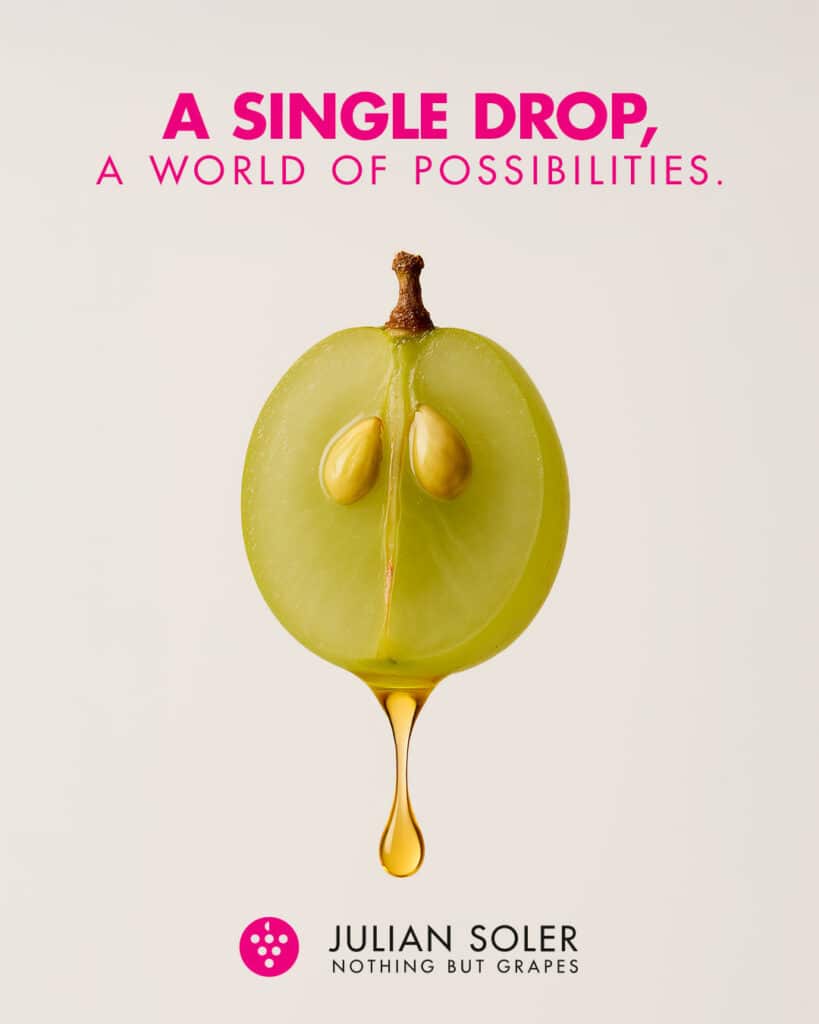
Concentrated grape juice does not contain alcohol. It is a 100% natural ingredient that retains all the nutritional and sensory properties of the original fruit, including its sweetness, acidity, and aroma. It stands out as a key ingredient in the development of non-alcoholic beverages for the following reasons:
Grape concentrate as a natural ingredient with high sensory and nutritional value
Concentrated grape must is rich in vitamins (A, C, K, and E), minerals (potassium, calcium, magnesium, iron, and phosphorus), phenolic compounds, and natural sugars. This profile benefits the body by providing energy, promoting cardiovascular health, reducing oxidative stress, preventing aging, and even helping to regulate the intestinal microbiota. From a sensory point of view, concentrated grape must provides fruity aromas, with hints of sweetness and light acidity that offer complex, sophisticated, authentic, and appealing sensory experiences, qualities that are highly valued in premium and gourmet beverages. In addition, its natural color, ranging from golden tones in concentrated white grape must to intense reds or purples in red musts, allows for the development of visually appealing products without the use of artificial colorants.
Versatility and flexibility in formulations
Grape must has an adjustable concentration, easily adapts to different sweetness, acidity, and body profiles, can be diluted or combined with other natural ingredients such as fruit juices, botanical extracts, herbal infusions, or carbonated waters, and can act as a natural sweetener, natural colorant, flavoring agent, and more. This versatility makes it a key ingredient for developing innovative products, such as organic, functional, non-alcoholic beverages with their own unique personality, aimed at the wellness market.
Concentrated grape must is a clean label ingredient.
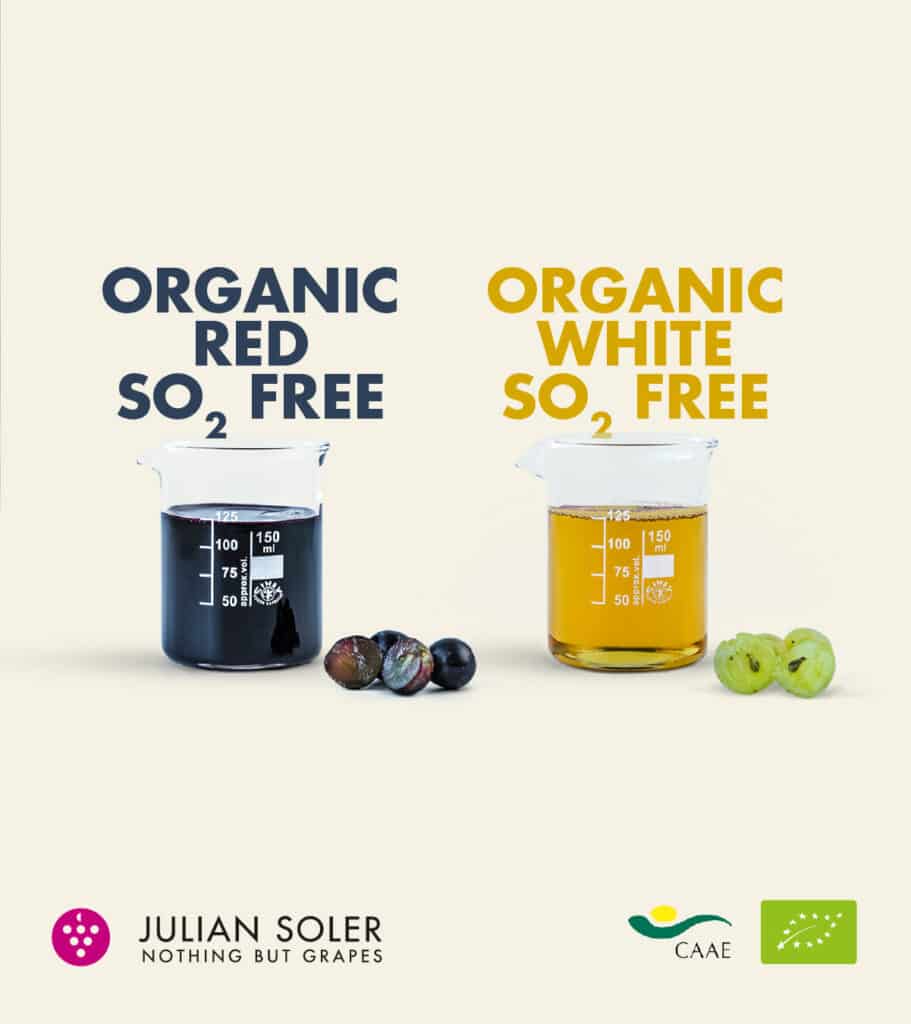
Grape concentrate is 100% grape, obtained naturally through vacuum evaporation, without adding sugars, preservatives, or additives. Furthermore, at JULIÁN SOLER we integrate total traceability of our must for maximum transparency and food safety, monitoring everything from the cultivation of the grapes in our vineyards to the delivery of the product to our customers.
Examples of non-alcoholic beverages made from concentrated grape must
Concentrated grape juice can be incorporated as the main base in many alcohol-free formulations, for example in:
- Sparkling grape juice (non-alcoholic sparkling juices).
- Non-alcoholic cocktails, bottled or canned.
- Dealcoholized wines.
- Non-alcoholic beers.
- Functional beverages.
- Premium flavored teas.
- Nectars.
- Vegetable shakes and smoothies.
- Ready-to-drink (RTD) beverages.
- Mocktails.
- Non-alcoholic aperitifs, such as non-alcoholic vermouth or bitters.
- Non-alcoholic digestifs.
One of its main applications is in the production of premium non-alcoholic beverages that replicate the organoleptic sensations of the best wines and sparkling wines, such as Cava or Prosecco, but without alcohol content and without synthetic additives. Concentrated grape juice allows us to offer consumers vibrant, natural, and healthy alternatives suitable for all types of audiences, including children, pregnant women, people who choose healthier lifestyles, and the most discerning palates.
JULIÁN SOLER: your partner in premium non-alcoholic beverage innovation
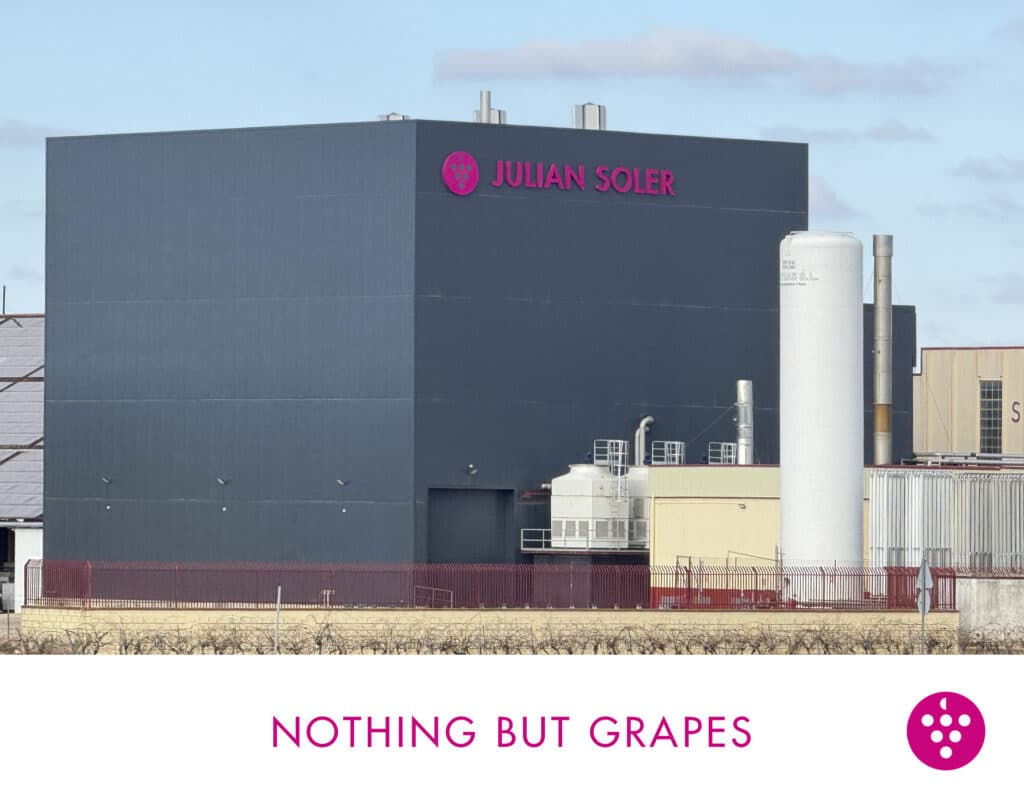
Not only do we produce and export the highest quality white and red grape must concentrate, without additives or preservatives, we also work closely with each customer to develop new beverage formulations based on must. To this end, we offer access to our R&D&I laboratory, equipped with state-of-the-art technology. We provide expert technical support and all our know-how at every stage of the project.
Looking for high-quality grape juice concentrate? Request a sample. We deliver the grape concentrate you need, when you need it and where you need it, anywhere on any of the five continents. We export to more than 60 countries. That’s why we are your Global Grape Solution Supplier.
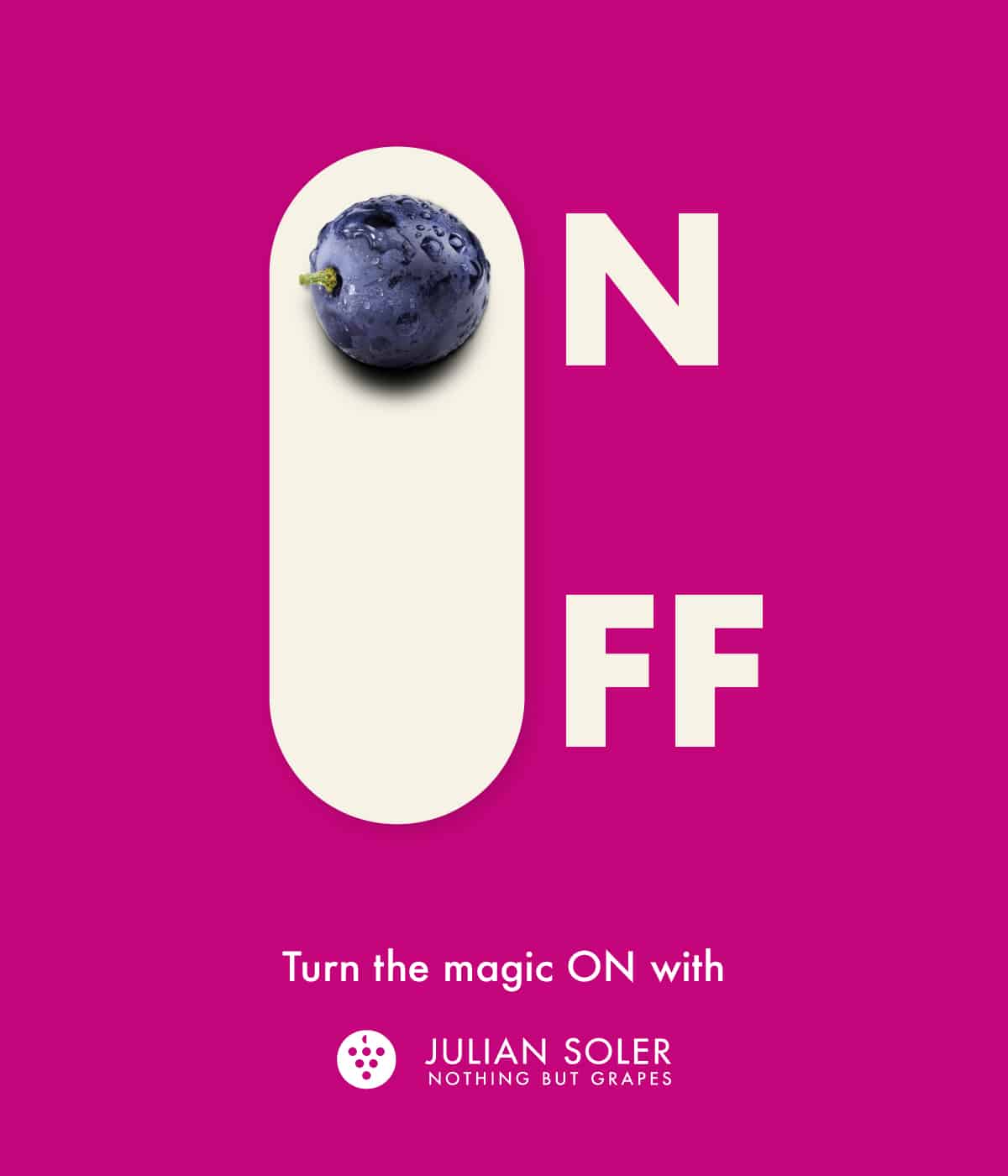
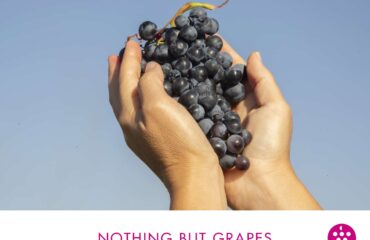


 by
by